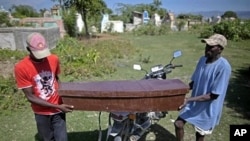Haitian officials say more than 250 people have died in a cholera outbreak centered in the Artibonite region, north of Port-au-Prince. Authorities fear the illness is spreading to the capital and other cities.
Haitian officials and relief groups in the country are expanding efforts to track the cholera outbreak and prevent it from spreading further across the country. Authorities say more than 3,000 people may have been infected with cholera, a water-borne disease that causes diarrhea and vomiting.
The outbreak is centered in the farming region of Artibonite, where experts fear an infection in the Artibonite River has enabled the illness to spread quickly.
The charity Food for the Poor is sending supplies to combat the outbreak, its executive director Angel Aloma says for many Haitians in the region, the river is used for bathing animals, cleaning motorcycles and as a public toilet.
"From this river is also where they get their bathing water and their cooking water, so you imagine how spreadable this thing [cholera] could be," Aloma said.
Aloma says relief workers in Haiti report the illness remains centered in Artibonite. But a handful of cases have begun to appear in the northern city of Cap Haitien, as well as the capital.
"Since cases have been appearing in Port-au-Prince in the south, and now to the north, that means people from the Artibonite, where the problem started, have been traveling probably to seek medical help and then spreading it to the different areas," Aloma said.
Haitian President Rene Preval visited the coastal town of Saint Marc on Sunday, to meet with local officials and doctors trying to combat the illness. He said health experts and media outlets should help inform residents about the symptoms of the illness and ways to avoid becoming infected.
For months, aid groups have expressed concern about the spread of disease in the tent cities that have formed since the January earthquake in Haiti. More than a million people lost their homes in the quake, and many live in open-air tents with little access to clean water or toilets.
Aloma says Food for the Poor has been distributing supplies that it had stored before hurricane season this year. He said the Florida-based charity also is installing 10 new water purification plants in the Artibonite region, which is known as Haiti's bread basket.
Aloma says they also are airlifting supplies of water chlorination tablets and hygiene kits.
"Hygiene kits have soap and toothpaste, because the hygiene is so poor there that cholera can spread through contact," Aloma said. "We hope they can have soap to wash hands after they tend to a child with cholera so they can avoid further transmission."
Health experts say proper hand-washing and clean drinking water are crucial in controlling the spread of cholera.
More Than 250 Dead in Haiti Cholera Outbreak














